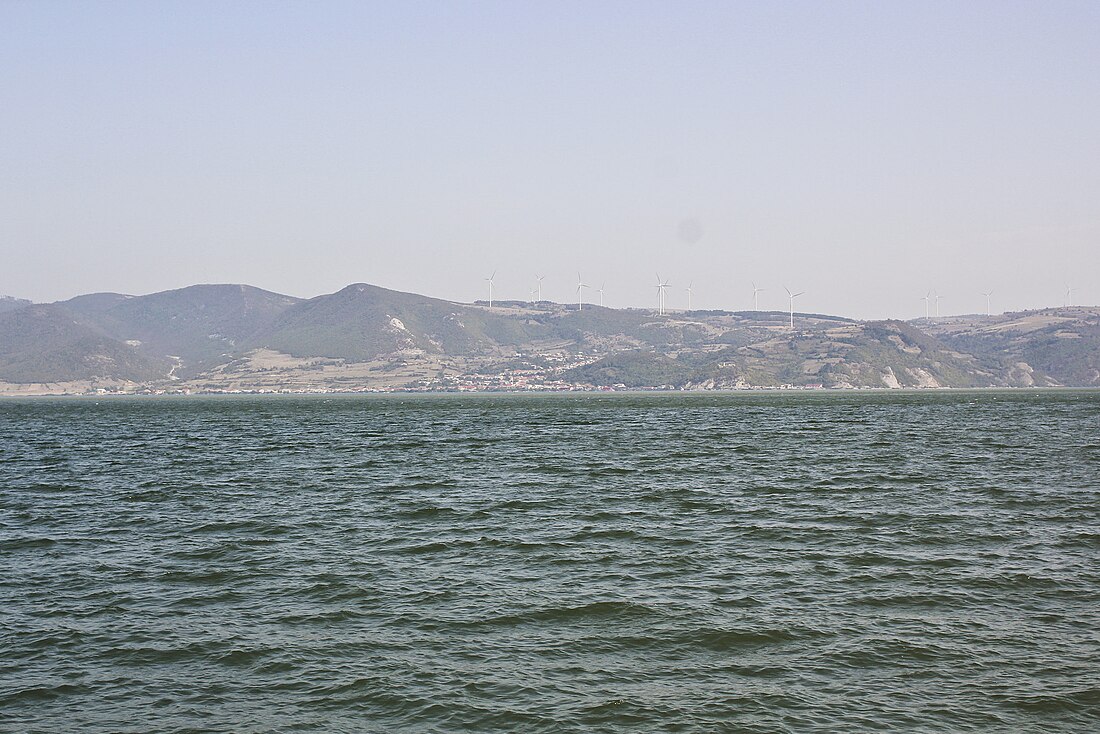The Braničevo District (Serbian Cyrillic: Браничевски округ, romanized: Braničevski okrug, pronounced [brǎnitʃɛv̞skiː ôkruːɡ]; Romanian: Districtul Braničevo) is one of nine administrative districts of Southern and Eastern Serbia. According to the 2022 census results, it has a population of 156,367 inhabitants. The administrative center of the district is Požarevac.
Braničevo District
Браничевски округ / Braničevski okrug Districtul Braničevo | |
|---|---|
|
Images from the Braničevo District | |
 Location of the Braničevo District within Serbia | |
| Coordinates: 44°37′N 21°11′E | |
| Country | |
| Region | Southern and Eastern Serbia |
| Administrative center | Požarevac |
| Government | |
| • Commissioner | Aleksandar Đokić |
| Area | |
| • Total | 3,865 km2 (1,492 sq mi) |
| Population (2022 census) | |
| • Total | 156,367 |
| • Density | 40/km2 (100/sq mi) |
| ISO 3166 code | RS-11 |
| Municipalities | 7 and 1 city |
| Settlements | 189 |
| - Cities and towns | 7 |
| - Villages | 182 |
| Website | branicevski |
It is named after the village of Braničevo.
History
In the 9th century, a Slavic tribe known as Braničevci are mentioned living in the region. In this time, the town named Braničevo also existed in the area, at the estuary of the river Mlava into Danube. In the Early Middle Ages, Braničevo became a part of the First Bulgarian Empire. After the conquest of Bulgaria, the Byzantines established the Theme of Sirmium in the wider region south of the river Danube.
By the 12th century, Braničevo was the centre of a Byzantine doukaton (duchy) governed by a doux (duke). The region saw significant fighting between the Byzantines and Hungarians. With the rise of the Second Bulgarian Empire and the Kingdom of Serbia, Byzantium's position in Braničevo became untenable. It appears to have finally slipped from their control in 1198. It was a frequent object of contention between the Bulgars, Serbs and Hungarians thereafter.[1]
In the 13th century the Hungarians established the Banate of Braničevo (Hungarian: Barancsi Bánság), but later in the century two local Bulgarian rulers, Darman and Kudelin, became independent and ruled over Braničevo and Kučevo. In 1291, they were defeated by the Serbian king, Stefan Dragutin, who joined Braničevo to his Syrmian Kingdom. Under his rule the town of Braničevo became a seat of the Eparchy of the Serbian Orthodox Church.[2] The region later belonged to subsequent Serbian states, until it was conquered by the Ottoman Empire in the 15th century. In the 14th century, the region was in a possession of local rulers from the House of Rastislalić. During the Ottoman rule, Braničevo was part of the Sanjak of Smederevo, and since 19th century, it is again part of the Serbian state.
Culture
In the mid-nineteenth century, at the time of the Serbian state emancipation, Požarevac became, along with Kragujevac, the second metropolis of Prince Miloš Obrenović. During his lifetime, Prince Miloš Obrenović had erected monuments to his memory in Požarevac:
- the church in 1819
- palace (1825)
- new marketplace (1827)
- stud-farm - Ljubicevo in 1860.
Some of the places of cultural importance in Požarevac are:
- the National Museum (the first built after Belgrade)
- the Tulba Ethnic Park (a unique outdoor museum)
- Gallery of Paintings of Milena Pavlović-Barili (a distinguished surrealistic artist and poet).
Municipalities
The district encompasses the municipalities of:

Demographics
| Year | Pop. | ±% |
|---|---|---|
| 1948 | 246,859 | — |
| 1953 | 259,329 | +5.1% |
| 1961 | 263,780 | +1.7% |
| 1971 | 263,466 | −0.1% |
| 1981 | 264,182 | +0.3% |
| 1991 | 253,992 | −3.9% |
| 2002 | 200,806 | −20.9% |
| 2011 | 183,625 | −8.6% |
| 2022 | 156,367 | −14.8% |
| Source: [3] | ||
According to the 2011 census results, the Braničevo District has a population of 183,625 inhabitants.
Ethnic groups
Ethnic composition of the Braničevo district:[4]
| Ethnic group | Population | % |
|---|---|---|
| Serbs | 155,255 | 84.55% |
| Vlachs | 13,238 | 7.21% |
| Romani | 4,629 | 2.52% |
| Romanians | 728 | 0.40% |
| Macedonians | 282 | 0.15% |
| Montenegrins | 242 | 0.13% |
| Croats | 189 | 0.10% |
| Yugoslavs | 160 | 0.09% |
| Hungarians | 108 | 0.06% |
| Others | 8,794 | 4.79% |
| Total | 183,625 |
See also
References
Sources
External links
Wikiwand in your browser!
Seamless Wikipedia browsing. On steroids.
Every time you click a link to Wikipedia, Wiktionary or Wikiquote in your browser's search results, it will show the modern Wikiwand interface.
Wikiwand extension is a five stars, simple, with minimum permission required to keep your browsing private, safe and transparent.















